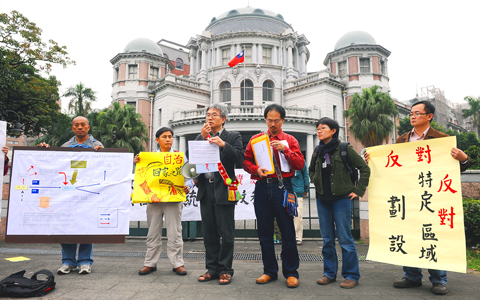Aboriginal groups yesterday filed a petition to the Control Yuan accusing the government of illegally declaring some Aboriginal areas “special zones” with bans on certain human activities.
The government earlier this month released a list of Aboriginal “special areas” that were not safe for habitation after Typhoon Morakot wreaked havoc in the south and east last August.
The designation became effective for the first three Aboriginal villages in Taitung and Pingtung Counties yesterday.

PHOTO: LO PEI-DER, TAIPEI TIMES
Aboriginal groups protested outside the Control Yuan and filed a formal complaint.
“A clause in Article 20 of the Post-Typhoon Morakot Reconstruction Special Act [莫拉克颱風災後重建特別條例] stipulates that governments — central or local — should negotiate with residents and reach a consensus before restricting residence or evacuating villages,” Hsiao Shih-huei (蕭世暉), a member of the Association for Taiwan Indigenous Peoples’ Policies, said at the demonstration.
“The same law also calls for governments to follow the Indigenous Peoples’ Basic Law [原住民族基本法] when dealing with Aboriginal domains, and [that law] requires that the government get consent from Aboriginal residents before making a decision that affects Aboriginal domains,” Hsiao said.
Hsiao said the Post-Typhoon Morakot Reconstruction Commission did not reach a consensus with Aborigines before announcing its list of “special zones.”
“Did the government act according to the Indigenous Peoples’ Basic Law? No! Was there consensus before the special zone designation? No! Did the government act according to the reconstruction act? No!” Hsiao said. “This is a serious violation of the law and an abuse of power.”
Wutu Micyang, representative of the Taiwan Alliance of Aboriginal Communities for Action, echoed Hsiao’s view.
“The government not only did not reach consensus with Aborigines, it tried to trick us when it explained to us what ‘special zones’ were. They tried to hide the negative side of the policy and told us only good things about it,” Wutu said. “They said only what compensation and assistance Aborigines can receive once their land is declared a special zone, and even said the designation won’t affect our rights at all.”
“If special zones won’t affect our rights, then why does the government want them?” Wutu questioned.
Aboriginal rights activist Omi Wilang questioned why parts of Taichung County that were not affected by Morakot had been included on the list of restricted zones and wondered whether some areas were put on the list to make way for corporations to build resorts or recreational parks.
Control Yuan member Yu Teng-fang (余騰芳), who sits on a special panel that is investigating the government’s response in the aftermath of Morakot, accepted the petition and promised to launch a probe into it.

Chinese Nationalist Party (KMT) Chairman Eric Chu (朱立倫), spokeswoman Yang Chih-yu (楊智伃) and Legislator Hsieh Lung-chieh (謝龍介) would be summoned by police for questioning for leading an illegal assembly on Thursday evening last week, Minister of the Interior Liu Shyh-fang (劉世芳) said today. The three KMT officials led an assembly outside the Taipei City Prosecutors’ Office, a restricted area where public assembly is not allowed, protesting the questioning of several KMT staff and searches of KMT headquarters and offices in a recall petition forgery case. Chu, Yang and Hsieh are all suspected of contravening the Assembly and Parade Act (集會遊行法) by holding

PRAISE: Japanese visitor Takashi Kubota said the Taiwanese temple architecture images showcased in the AI Art Gallery were the most impressive displays he saw Taiwan does not have an official pavilion at the World Expo in Osaka, Japan, because of its diplomatic predicament, but the government-backed Tech World pavilion is drawing interest with its unique recreations of works by Taiwanese artists. The pavilion features an artificial intelligence (AI)-based art gallery showcasing works of famous Taiwanese artists from the Japanese colonial period using innovative technologies. Among its main simulated displays are Eastern gouache paintings by Chen Chin (陳進), Lin Yu-shan (林玉山) and Kuo Hsueh-hu (郭雪湖), who were the three young Taiwanese painters selected for the East Asian Painting exhibition in 1927. Gouache is a water-based

Taiwan would welcome the return of Honduras as a diplomatic ally if its next president decides to make such a move, Minister of Foreign Affairs Lin Chia-lung (林佳龍) said yesterday. “Of course, we would welcome Honduras if they want to restore diplomatic ties with Taiwan after their elections,” Lin said at a meeting of the legislature’s Foreign Affairs and National Defense Committee, when asked to comment on statements made by two of the three Honduran presidential candidates during the presidential campaign in the Central American country. Taiwan is paying close attention to the region as a whole in the wake of a

OFF-TARGET: More than 30,000 participants were expected to take part in the Games next month, but only 6,550 foreign and 19,400 Taiwanese athletes have registered Taipei city councilors yesterday blasted the organizers of next month’s World Masters Games over sudden timetable and venue changes, which they said have caused thousands of participants to back out of the international sporting event, among other organizational issues. They also cited visa delays and political interference by China as reasons many foreign athletes are requesting refunds for the event, to be held from May 17 to 30. Jointly organized by the Taipei and New Taipei City governments, the games have been rocked by numerous controversies since preparations began in 2020. Taipei City Councilor Lin Yen-feng (林延鳳) said yesterday that new measures by